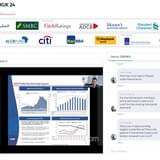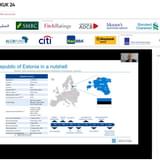Bonds & Loans: Turkish markets have gained lots of attention in recent months – but largely for the wrong reasons. What is the biggest challenge currently facing the banking sector?
Malek Temsah: Stubbornly high inflation, recent volatilities in the lira, and tight domestic liquidity conditions in the sector are all naturally posing challenges for banks. While the Central Bank of Turkey has been tightening monetary policy since 2017 to tackle the inflation issue (vis-à-vis hikes to its late liquidity window) as well as to address Lira downside pressures, banks have been embarking on a loan growth spree on the back of the TRY 250 billion guarantee fund, which helped to stimulate consumer and business aggregate demand, and which resulted in a 21% expansion of the sector’s outstanding loans in 2017. On the other hand, total deposits in the sector grew by only 16% over the same period and the subsequent loan to deposit ratio of banks reached as high as 145% before falling back to the range of 120%. To plug this gap between loan and deposit growth rates, Turkish banks have continued to tap global debt capital markets and while we collectively have successully rolled over all our maturing debt transactions in 2017, we remain susceptible to fickle investor appetite towards emerging markets and Turkish assets.
The recent volatilities we are witnessing in the Turkish lira are also posing challenges on both the asset and liability sides of the balance sheets, albeit manageable. On the one hand, Turkish banks are increasingly dealing with constant fluidity in the underlying currency denomination of our deposit base due to customers actively buying/selling Lira which means our liquidity surpluses and deficits are constantly changing in terms of currency denomination. On the other hand, continued pressure on the Turkish lira does adversely feed through to consumer and business sentiment domestically whilst leading to rising FX debt servicing burdens of unhedged foreign currency corporate borrowers. Having said that, when we look at bank balance sheets in Turkey today, we are certainly in a much better position to absorb these reverberations due to our stronger capital adequacy levels, our comfortable aggregate liquidity coverage ratios, and a more sound regulatory and macroprudential framework that exists.
 Bonds & Loans: You mentioned the credit guarantee fund, a policy that had quite a bit to do with creating that inflation. Overall, was the policy beneficial for the economy?
Bonds & Loans: You mentioned the credit guarantee fund, a policy that had quite a bit to do with creating that inflation. Overall, was the policy beneficial for the economy?
Malek Temsah: When we look back at 2016, the Turkish economy was confronting a plethora of issues such as the terrorist attacks in our country, the failed coup attempt, and challenging geopolitical issues which in aggregate impacted tourism and consumer sentiment as well as the overall business outlook. The subsequent contraction we witnessed in the third quarter of 2016 was a reflection of these circumstances and as such, the introduction of the TRY 250 billion Credit Guarantee Fund was a “must have” in boosting the Turkish economy. While the fund did succeed in restoring consumer and business confidence as evidenced by the 7% growth in the Turkish economy that we witnessed in 2017, it has also helped feed into higher inflation, which is currently running at around the 10% levels, roughly twice of the target of the Central Bank. While the fund may have contributed to cyclical elements of our short-term inflation, this inflation is also being created by Turkish lira depreciation, rising energy prices, and structural issues as supply-side food inflation.
Most importantly, what the credit guarantee fund did was give banks the psychological boost they needed to lend and to sustain private sector borrowing and hence consumption, which represents roughly 60% of Turkish growth. It’s important to note that the government also stimulated demand by other fiscal measures such as reducing taxes on real estate and white goods, which was crucial in ensuring the funds made their way into the real economy.
Bonds & Loans: Geopolitical risk has always been a factor for Turkish markets, but it seems to be playing an overweight role influencing the market over the past 12-18 months. Do you see any signs of this easing any time soon?
Malek Temsah: Geopolitical risk has indeed been a critical market sentiment driver for Turkish markets and in fact, geopolitical risks such as the potential trade was between the US and China have also emerged at the forefront of global market concerns as well.
Given that Turkey sits at the crossroads of Europe and the Middle East, it is natural that we have always been at the forefront of and impacted by key regional issues such as the Syrian war and other post-Arab spring reverberations. While Turkey has been pivoting eastwards to bolster its ties with Russia and Asian nations which it enjoys historical, economic, and cultural ties with, we continue to place great importance on our ties with Europe, which after all is our largest trade partner by far as a region and still represents one of the main sources of FDI into Turkey vis-à-vis the presence of entities such as the EBRD.
Turkey, like other major countries, has been more engaged regionally and this increased engagement has naturally meant that we have had to strike a difficult balance in ever-complex situations regionally. As a case in point, the growing visibility of Turkey’s economic and military linkages with Qatar, one of our partners in the region, has also added a new dimension to our relationship with the rest of the GCC, given the blockades led by Saudi and the UAE, two countries we also enjoy strong relations with.
Geopolitical risks are increasingly embedding themselves as a key investor consideration both in our region and globally and while these risks may not abate in the short run, investors are increasingly learning to cope with them and adjust their investment approach accordingly.
Bonds & Loans: Beyond geopolitics, how exposed is the Turkish economy to some of the broader macro shifts we are seeing – namely, monetary policy normalisation?
Malek Temsah: There continue to be strong flows to emerging market countries, Turkey included, but the main question on everyone’s minds is: how will emerging market flows – including flows into Turkey – react to rising interest rates in the US?
While some analysts are forecasting a material withdrawal of “hot funds” from EM markets including Turkey back into developed markets, I just don’t see it happening – for two reasons.
First, if you look at the way the Fed is unwinding its QE, it is actually proceeding quite cautiously. The whole process is tied to their inflation and wage growth outlook, and their moves seem to be well-communicated to the market and telegraphed in advance. While rates will rise in the US, these hikes will be gradual and will as such allow emerging markets to gradually digest any change in global capital flows.
Second, and perhaps more importantly, Turkey’s sources of liquidity have re-balanced in recent years. European banks sill constitute a significant source of liquidity for Turkish entities, but over the past decade, investors from the Middle East have become much more prominent sources of funding for domestic borrowers. This is complemented by the growing presence of more Arab and Middle Eastern banks in Turkey – including Albaraka Turk. While relative yields may increasingly become less appealing, the absolute yield offer in Turkey still remain quiet appealing to a large sub-set of global investors, whom remain yield-hungry and whom, despite Turkey’ challenges, take comfort from our compelling macroeconomic fundamentals and demographics.









